Transform Your Outdoor Space with Landscape Gardening in Hatch End
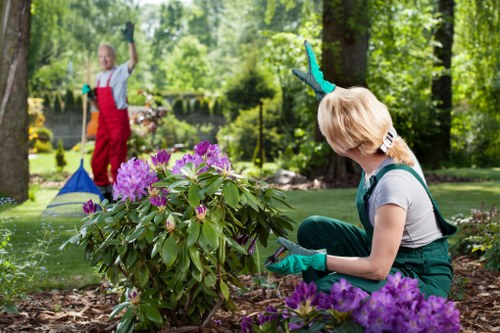
Landscape gardening in Hatch End offers homeowners a unique opportunity to enhance their outdoor spaces, creating beautiful and functional environments tailored to individual tastes and lifestyles. Whether you're seeking a tranquil garden retreat or a vibrant area for entertaining, Hatch End's versatile climate and soil conditions provide the perfect backdrop for a wide variety of gardening styles.
Embracing landscape gardening not only boosts the aesthetic appeal of your property but also contributes to environmental sustainability. By carefully selecting plants, incorporating hardscaping elements, and implementing eco-friendly practices, you can create a garden that thrives year-round while minimizing your ecological footprint.
In this comprehensive guide, we'll explore the benefits of landscape gardening in Hatch End, offer design and maintenance tips, and highlight the advantages of hiring professional landscape gardeners to bring your vision to life.
Benefits of Landscape Gardening in Hatch End
Enhances Curb Appeal
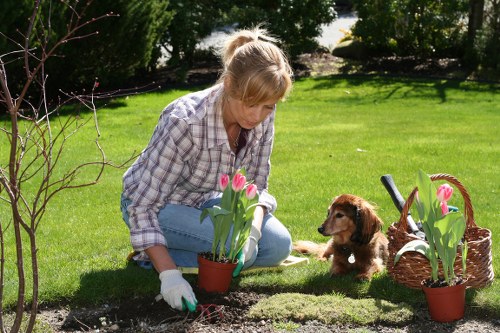
A well-designed landscape garden significantly enhances the curb appeal of your home, making a strong first impression on visitors and potential buyers. Thoughtfully arranged plants, vibrant flowers, and attractive garden features can transform the exterior of your property, showcasing your personal style and attention to detail.
In Hatch End, where community aesthetics matter, investing in landscape gardening can contribute to the overall neighborhood ambiance. A beautiful garden not only reflects positively on your home but also inspires neighbors to maintain their own outdoor spaces, fostering a sense of pride and community spirit.
Moreover, strategic landscaping can conceal unsightly elements such as fences or utility boxes, creating a more cohesive and appealing visual presentation. By carefully selecting plant species and garden structures, you can achieve a balanced and harmonious look that complements your home's architecture.
Promotes Sustainability
Eco-Friendly Practices
Implementing sustainable gardening practices is increasingly important in today's environmentally conscious world. Landscape gardening in Hatch End can incorporate eco-friendly methods such as rainwater harvesting, composting, and the use of native plants to reduce water consumption and support local biodiversity.
Using native plant species not only reduces the need for excessive watering and maintenance but also provides essential habitats for local wildlife, including pollinators like bees and butterflies. Additionally, sustainable gardening practices help improve soil health, reduce waste, and lower your overall environmental impact.
Adopting green gardening techniques not only benefits the planet but also enhances the resilience and longevity of your garden, ensuring it remains beautiful and productive for years to come.
Increases Property Value
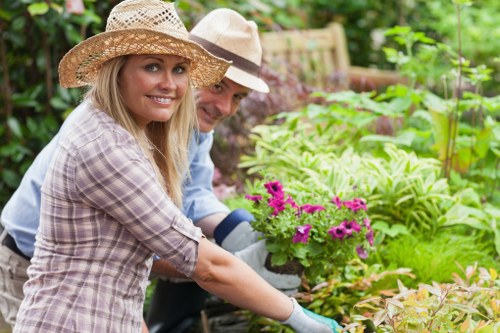
Investing in landscape gardening can significantly increase your property's market value. A well-maintained garden adds to the overall attractiveness of your home, making it more appealing to potential buyers and potentially leading to higher sale prices.
In Hatch End, where the real estate market is competitive, a stunning landscape garden can set your property apart from others. Features such as manicured lawns, stylish plantings, and functional outdoor living areas can make your home more desirable, attracting a wider pool of interested buyers.
Furthermore, a professionally designed garden suggests to buyers that the property has been well cared for, reducing concerns about potential landscaping or maintenance issues. This can streamline the selling process and contribute to a faster, more profitable sale.
Designing Your Landscape Garden
Planning and Layout
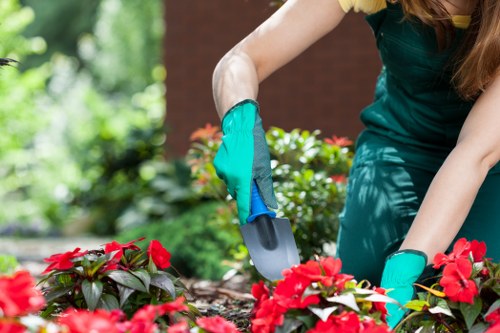
Effective landscape gardening begins with careful planning and layout. Assessing your outdoor space, understanding its unique features, and identifying your goals are crucial steps in creating a functional and aesthetically pleasing garden.
Consider factors such as sunlight exposure, soil quality, drainage, and existing structures when designing your garden. Creating a detailed plan that outlines the placement of plants, paths, and garden features will help ensure a cohesive and harmonious design.
Using tools like grid layouts or landscape design software can assist in visualizing your ideas and making adjustments before implementation. Consulting with professional gardeners can also provide valuable insights and expertise to refine your design.
Choosing the Right Plants
Climate and Soil Considerations
Selecting the appropriate plants is essential for a thriving landscape garden in Hatch End. Understanding the local climate, including temperature ranges, rainfall patterns, and seasonal variations, will guide your plant choices.
Additionally, assessing soil type and quality helps determine which plants will thrive in your garden. Incorporating a mix of native and adaptable species can enhance resilience and reduce maintenance requirements.
Key considerations:
- Sunlight requirements
- Watering needs
- Growth habits
- Bloom times
- Maintenance levels
Incorporating Hardscaping Elements
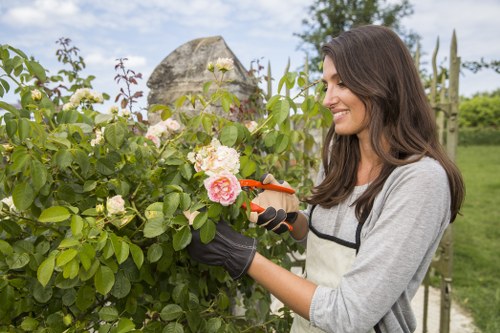
Hardscaping elements such as pathways, patios, fences, and garden structures play a vital role in landscape gardening. These features not only provide functionality but also add visual interest and structure to your garden.
Incorporating materials like natural stone, brick, or wood can complement your plantings and create a cohesive design aesthetic. Well-placed hardscape features can define different areas of your garden, create focal points, and facilitate easy navigation.
Balancing hardscaping and softscaping ensures that your garden remains both beautiful and practical, providing spaces for relaxation, entertainment, and everyday enjoyment.
Seasonal Gardening Tips for Hatch End
Spring Planting
Preparing for Growth
Spring is an ideal time for planting new flowers, shrubs, and trees in your Hatch End garden. As the weather warms and days lengthen, plants begin their active growth phase, making it the perfect season to introduce fresh greenery.
Before planting, prepare your soil by removing weeds, adding compost, and ensuring proper drainage. Selecting plants that bloom in spring can provide an early burst of color and set the tone for the rest of the gardening season.
Consider planting bulbs for spring flowers such as tulips and daffodils, which will naturalize and come back year after year, requiring minimal maintenance.
Summer Maintenance
Keeping Your Garden Thriving
During the summer months, garden maintenance is crucial to ensure plants remain healthy and vibrant. Regular watering, especially during dry spells, helps sustain plant growth and prevent stress.
Pruning and deadheading spent blooms encourages new growth and prolongs the flowering season. Mulching helps retain soil moisture, suppress weeds, and regulate soil temperature.
Implementing a consistent maintenance routine can keep your Hatch End garden looking its best throughout the summer.
Summer tasks include:
- Watering deeply and infrequently
- Pruning overgrown plants
- Applying mulch around plants
- Monitoring for pests and diseases
Autumn Preparation
Setting Up for Winter
Autumn is a time for preparing your garden for the colder months ahead. Clearing fallen leaves, cutting back perennials, and protecting tender plants are essential steps to ensure your garden remains healthy during winter.
Planting winter-flowering species can provide bursts of color even in the dormant season, adding interest and variety to your landscape.
Mulching around plants helps insulate roots and regulate soil temperature, offering added protection against frost and freezing temperatures.
Winter Protection
Maintaining Garden Health
Winter weather can pose challenges for garden maintenance, but with proper care, your landscape can thrive even in the colder months. Protecting plants from frost, snow, and ice is crucial to prevent damage and ensure their survival.
Using protective coverings such as burlap or fleece can shield sensitive plants from harsh weather conditions. Pruning deciduous shrubs and trees during dormancy helps maintain their shape and promotes healthy growth in the spring.
Regularly removing debris and fallen leaves reduces the risk of pest infestations and fungal diseases, keeping your garden resilient through winter.
Sustainable Gardening Practices
Water Conservation
Efficient Irrigation Systems
Conserving water is a critical aspect of sustainable landscape gardening. Implementing efficient irrigation systems, such as drip irrigation or soaker hoses, ensures that plants receive the necessary moisture without excess waste.
Collecting and utilizing rainwater through barrels or rain gardens can further reduce reliance on municipal water sources, promoting environmental stewardship and reducing utility costs.
Additionally, grouping plants with similar water needs together minimizes water waste and simplifies maintenance efforts.
Organic Gardening
Natural Fertilizers and Pest Control
Organic gardening emphasizes the use of natural fertilizers and pest control methods to maintain a healthy and balanced ecosystem. Composting kitchen scraps and garden waste creates nutrient-rich soil amendments that enhance plant growth without the need for synthetic chemicals.
Encouraging beneficial insects, such as ladybugs and praying mantises, helps manage pest populations naturally, reducing the need for harmful pesticides.
By adopting organic practices, you can cultivate a garden that is both beautiful and environmentally friendly, supporting biodiversity and soil health.
Wildlife-Friendly Gardens
Attracting Beneficial Species
Creating a wildlife-friendly garden in Hatch End enhances biodiversity and fosters a vibrant ecosystem. Incorporating features such as birdhouses, insect hotels, and water sources attracts a variety of beneficial species, including pollinators and natural pest controllers.
Planting a diverse array of native flowers, shrubs, and trees provides food and shelter for birds, butterflies, and other wildlife, contributing to a balanced and thriving garden environment.
Wildlife-friendly gardens not only support local ecosystems but also offer delightful opportunities for observation and enjoyment, adding a dynamic element to your outdoor space.
Hiring Professional Landscape Gardeners in Hatch End
What to Look For
Qualifications and Experience
When seeking professional landscape gardeners in Hatch End, it's important to consider their qualifications, experience, and portfolio. Experienced gardeners bring valuable expertise in design, plant selection, and maintenance, ensuring your landscape project is executed to the highest standards.
Look for professionals who are familiar with the local climate and soil conditions, as this knowledge is essential for creating a thriving garden. Certifications, memberships in gardening associations, and positive reviews are indicators of a gardener's reliability and proficiency.
Reviewing a gardener's portfolio allows you to assess their style and ensure it aligns with your vision, providing confidence in their ability to deliver the desired results.
Benefits of Professional Services
Expert Guidance and Creativity
Hiring professional landscape gardeners offers numerous benefits, including expert guidance in design and plant selection, creative solutions tailored to your space, and efficient project management.
Professionals can help you navigate the complexities of landscape gardening, offering insights into the latest trends, sustainable practices, and low-maintenance plant options that suit your lifestyle and preferences.
Additionally, professional gardeners have access to quality materials and resources, ensuring that your garden is built to last and remains beautiful with minimal upkeep.
Questions to Ask
Ensuring the Right Fit
To ensure you hire the right professional for your landscape gardening needs, consider asking the following questions:
- Can you provide references or examples of past projects?
- What is your approach to sustainable gardening practices?
- How do you handle project timelines and budgets?
- What services are included in your landscaping packages?
- Are you insured and licensed?
These questions help clarify expectations, assess the gardener's qualifications, and ensure a smooth and successful collaboration.
DIY Landscaping Projects
Building a Raised Bed
Creating Your Own Planting Area
Building a raised bed is a rewarding DIY project that can enhance your landscape garden's functionality and aesthetics. Raised beds offer better soil control, improved drainage, and easier access for planting and maintenance.
Choose materials such as wood, stone, or recycled materials that complement your garden's design. Construct the frame, fill it with high-quality soil, and select a variety of plants that suit your gardening goals and local conditions.
Raised beds can be customized in size and shape to fit your space, providing a versatile and attractive addition to your Hatch End garden.
Installing a Garden Pathway
Enhancing Accessibility and Beauty
Installing a garden pathway not only improves accessibility but also adds visual interest to your landscape. Pathways guide visitors through your garden, highlighting key features and creating a sense of flow.
Select materials that complement your garden's style, such as gravel, flagstone, or brick. Proper installation ensures durability and safety, preventing erosion and trip hazards.
A well-designed pathway can transform your garden into a cohesive and inviting space, encouraging exploration and enjoyment.
Creating a Compost Area
Promoting Sustainability
Creating a compost area is an excellent DIY project that supports sustainable gardening practices. Composting organic waste reduces landfill contributions and provides nutrient-rich soil amendments for your garden.
Choose a suitable location for your compost bin, ensuring it is easily accessible yet discreet. Use materials such as wood pallets, wire mesh, or commercially available compost containers to build your compost system.
Regularly adding kitchen scraps, garden waste, and maintaining proper moisture levels accelerates the composting process, resulting in valuable compost for your landscape garden.
Maintaining Your Landscape Garden
Regular Pruning and Trimming
Encouraging Healthy Growth
Regular pruning and trimming are essential for maintaining the health and appearance of your landscape garden. Removing dead or diseased branches, shaping plants, and controlling growth helps prevent overcrowding and promotes robust growth.
Proper pruning techniques vary depending on the plant species, so it's important to research or consult with a professional to ensure you're performing tasks correctly.
Consistent maintenance keeps your garden looking its best and supports the long-term vitality of your plants.
Weed Control
Keeping Your Garden Tidy
Effective weed control is crucial for maintaining a healthy garden. Weeds compete with your desired plants for nutrients, water, and light, hindering their growth and reducing overall garden productivity.
Implementing preventive measures such as mulching and landscape fabric can reduce weed emergence. Regularly removing weeds by hand or using organic herbicides helps keep your garden tidy and promotes the health of your plants.
Maintaining a weed-free garden also enhances its visual appeal, creating a more polished and inviting outdoor space.
Fertilizing and Soil Health
Nourishing Your Plants
Fertilizing is a key component of garden maintenance, providing essential nutrients that support plant growth and vitality. Selecting the right fertilizer based on your soil's needs ensures that your plants receive the necessary nourishment.
Conducting a soil test can help determine nutrient deficiencies and guide your fertilization strategy. Organic fertilizers, such as compost and manure, enrich the soil naturally, promoting microbial activity and improving soil structure.
Maintaining soil health through regular fertilization and organic amendments results in a more resilient and productive landscape garden.
Conclusion
Landscape gardening in Hatch End is a rewarding endeavor that transforms outdoor spaces into beautiful, functional, and sustainable environments. By understanding the benefits, implementing thoughtful design and maintenance practices, and leveraging professional expertise, you can create a garden that enhances your property's appeal and provides lasting enjoyment.
Whether you're embarking on a major landscaping project or making small improvements, the key to success lies in careful planning, appropriate plant selection, and consistent care. Embrace the opportunities that landscape gardening offers and watch your Hatch End garden flourish.
Ready to transform your outdoor space? Contact us today to book your landscape gardening service and begin creating the garden of your dreams!
Garden Maintenance Hatch End
Discover the art of landscape gardening in Hatch End with our comprehensive guide. From design tips to sustainable practices, transform your outdoor space beautifully.
Get A Quote




